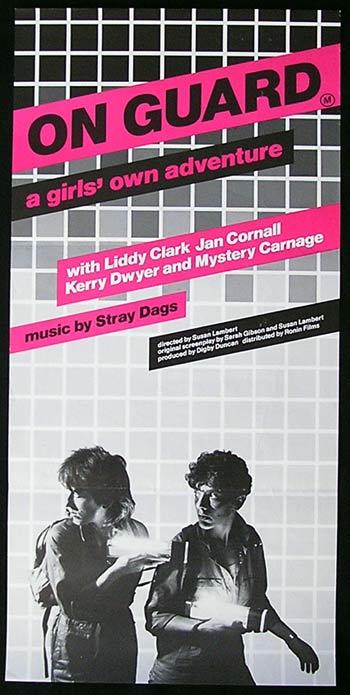
ON GUARD
Australia, 1984, 50 minutes, Colour.
Liddy Clark, Jan Cornall, Kerry Dwyer.
Directed by Susan Lambert.
On Guard is a short feature, described as a Women's Own or Girls' Own adventure. It is a picture of urban terrorism in Sydney - related to a multinational which is doing secret investigation into the control of women and their reproductive system: Utero. The film uses the style of the planning of a terrorist raid and ultimately portrays it. There are days and times indicated. The film also offers a quick sketch of a group of women at work in Sydney and protesting. The film was made by an all-women team of Sydney feminists under the direction of writer-director Susan Lambert. Professional actresses play the central roles, led by Liddy Clark (Kitty and the Bagman). While the film has an action-thriller format, it is very much a message film about women's issues.
1. The impact of the film as entertainment, message film? A short feature with a point of view?
2. The city of Sydney, homes, the multinational plant - authentic Australia? Location photography? The importance of editing and pace for the build-up to the raid and the carrying out of the action? The score: songs, background music?
3. How accurate is the description: Girls' own adventure: characters, situations. motivation. action?
4. The strength of the feminist viewpoint: the women responsible for the writing, making and direction of the film? The feminine perspective? Feminist perspective? The focus on the multinationals and their power, research, resources, secrecy, files? The choice of the name Utero and the issues of women's sexuality, capacity for motherhood, reproduction system, physiology. artificial experiments? The relevance to developments such as in vitro fertilisation in the '70s and 180s. test-tube babies? Women's rights to the functioning of their bodies? The manipulation of multinational firms? The questions of fertility and motherhood? Women's rights and exploitation? Women's relationships? Family, motherhood? The lesbian focus in the film? As background, as a way of relating, as a symbol for the feminist viewpoint?
5. Utero and multinationals, their plant. research capacity, secrecy, computers and files? Employees? The payment of women for experiments? Industrial espionage?
6. The point made by the feminists about fertility research and the parallel with nuclear developments in the '40s and '50s? Eagerness for research. acceptability of experimentation. hope in development - but later decades seeing the dangers and the destructive aspects of such experimentation?
7. The interviews with various personnel, scientists. investigators, the three women who had been part of the experiment? The technique of television interviewing and audience response to personalities, information, viewpoints? The nurse and her interview and her being sacked? The harassment of the three women who gave the interview? The interview finally with the professional women?
8. The focus on technology, computers and files? The making of a background documentary to show after the sabotage action took place?
9. The importance of terrorism and sabotage? As a way of protest? Relationship with the law? The consequences?
10. The information given about the plan, the indication of the days, the individuals and their work, preparation, tensions? The defining of particular tasks during the raid? Plans, rehearsals?
11. The execution of the plan. the various devices used to enter the plant, false identification cards, distracting the watchman? Knowledge of the plant? Pace and timing? Pursuit at the end? Ultimate success? The audience's emotional response to this?
12. The sketch of each of the women: Amelia: her work. responsibility in the house, her various jobs, the significance of her losing the diary (and its being shown as picked up, on the seat of a car - the anonymous identity of the finder of the diary and the use of it)? Her worry, reactions. commitment to the cause, participation in the plan and the execution of it? Diana: her aerobics class, toughness, relationship with Adrienne, emotional relationship. the lesbian viewpoint, her participation in preparations, pressure on Adrienne, stealing the identity card. taking part in the action? Adrienne: involved in the situation. her relationship with her children, with Diana, her husband and his comfortable house and practice, the lesbian relationship. her work on the television documentary, her unwillingness to take part in the action, her eventual participation? Georgia: friendship. her place in the group. her role in the action and her participation?
13. The aftermath of the action and its significance for the Australian public? The importance of the witness value, exposure, the destruction of ten years of work?
14. The meaning of such a protest, a gesture for individual rights. for women? For quality of life in Australia?